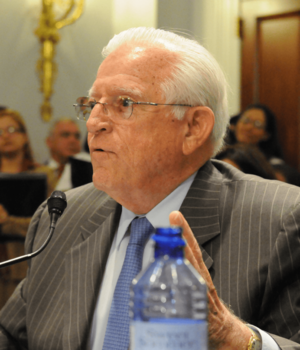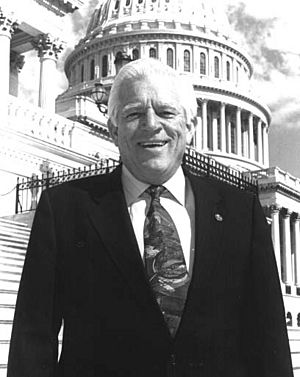Carlos Romero Barceló facts for kids
Quick facts for kids
Carlos Romero Barceló
|
|
|---|---|
 |
|
| United States Shadow Senator from Puerto Rico |
|
| In office August 15, 2017 – May 2, 2021 |
|
| Appointed by | Ricardo Rosselló |
| Preceded by | Position established |
| Succeeded by | Zoraida Buxó |
| Resident Commissioner of Puerto Rico | |
| In office January 3, 1993 – January 3, 2001 |
|
| Preceded by | Antonio Colorado |
| Succeeded by | Aníbal Acevedo Vilá |
| Governor of Puerto Rico | |
| In office January 2, 1977 – January 2, 1985 |
|
| Preceded by | Rafael Hernández Colón |
| Succeeded by | Rafael Hernández Colón |
| Mayor of San Juan | |
| In office January 2, 1969 – January 2, 1977 |
|
| Preceded by | Felisa Rincón de Gautier |
| Succeeded by | Hernán Padilla |
| Personal details | |
| Born |
Carlos Antonio Romero Barceló
September 4, 1932 San Juan, Puerto Rico |
| Died | May 2, 2021 (aged 88) San Juan, Puerto Rico |
| Political party | Republican Statehood (Before 1967) New Progressive (1967–2021) |
| Other political affiliations |
Democratic |
| Spouse |
Kate de Romero
(m. 1966) |
| Children | 4, including Melinda |
| Education | Yale University (BA) University of Puerto Rico, Río Piedras (LLB) |
Carlos Antonio Romero Barceló (born September 4, 1932 – died May 2, 2021) was an important Puerto Rican politician. He served as the governor of Puerto Rico from 1977 to 1985. He was the second governor from the New Progressive Party (PNP). He also worked for two terms in the U.S. Congress as the 16th Resident Commissioner of Puerto Rico from 1993 to 2001.
Carlos Romero Barceló was the grandson of Antonio R. Barceló. Antonio R. Barceló was a leader who supported Puerto Rican independence in the early 1900s. Carlos's mother, Josefina Barceló, was the first woman to lead a major political party in Puerto Rico.
Contents
Early Life and Education
Carlos Romero Barceló was born in 1932 in San Juan, Puerto Rico. His parents were Antonio Romero Moreno and Josefina Barceló Bird. His father was a lawyer and a judge. His grandfather, Antonio Rafael Barceló, came from Palma, Majorca, Spain.
Carlos went to Phillips Exeter Academy in New Hampshire and finished in 1949. He then studied at Yale University, earning a degree in Political Science and Economics in 1953. At 21, he returned to Puerto Rico. He studied law at the University of Puerto Rico Law School and became a lawyer in 1956.
Political Career
Romero Barceló strongly believed that Puerto Rico should become a U.S. state. He joined the "Partido Estadista Republicano," which later became the New Progressive Party. In 1965, he was part of "Ciudadanos pro Estado 51" (Citizens for the 51st State). He also helped start "Estadistas Unidos," a group that supported statehood.
Mayor of San Juan
Romero Barceló was one of the people who helped create the New Progressive Party in 1967. The next year, he was elected Mayor of San Juan, Puerto Rico. He took over from the well-known "doña Fela" (Felisa Rincón de Gautier). He was the first mayor of San Juan chosen directly by the people. Before him, mayors were picked by the city council.
In 1973, during his second term, he became the first Hispanic person to be vice-president of the National League of Cities. In 1974, he became its president. He was mayor until 1976. During his time as mayor, San Juan joined the U.S. President Lyndon Johnson's Model Cities Program. This program helped improve areas like "El Fanguito." He also oversaw the building of the Roberto Clemente Coliseum and the first city-run college, the Colegio Universitario de San Juan.
Governor of Puerto Rico
In 1976, Romero Barceló was elected Governor of Puerto Rico. He won against the current governor, Rafael Hernández Colón. As governor, he focused on improving Puerto Rico's economy, especially by promoting tourism. However, the economy grew slowly, and unemployment remained high during his first term.
In 1980, he was re-elected for a second term. He won by a very small number of votes against Rafael Hernández Colón. This election was one of the closest in Puerto Rican history. The Puerto Rico Statehood Students Association, led by Luis Fortuño, helped him win by getting many absentee ballots. Even though he won, his party lost control of the legislature.
During his second term, Puerto Rico faced a difficult economic time from 1980 to 1983. Unemployment went up to 25% in 1983. This was the highest it had been since the Great Depression.
Romero Barceló's time as governor is often linked to the "Cerro Maravilla Incident" of 1978. This event involved the deaths of two young activists. The incident was investigated many times by different government groups, including the U.S. Justice Department and the F.B.I.. In 1984, ten police officers were found guilty of crimes like lying and destroying evidence. Four officers were also convicted of murder.
He tried to win a third term as governor in 1984 but lost to Rafael Hernández Colón. After losing, when a reporter asked him about the defeat, he famously said, ¿Derrota, qué Derrota? (Defeat, what defeat?). He meant that it was not a defeat, but just an "electoral loss." This comment is still remembered in Puerto Rican politics.
Senator and Resident Commissioner
In 1986, his party chose him to fill an empty seat in the Senate of Puerto Rico. He did not run for re-election in 1988. Instead, he went back to working as a lawyer.

In 1992, Romero Barceló was elected as the Resident Commissioner of Puerto Rico to the U.S. Congress. He moved to Washington, D.C.. He was re-elected two more times, serving until 2001. As Resident Commissioner, he worked hard for Puerto Rican statehood. He also helped get rid of a special tax rule (the 936 tax code) and supported a plan to hold a vote on Puerto Rico's political status. In 2000, he lost his bid for a third term. He tried again in 2003 but was not chosen by his party. Even after leaving elected politics, he stayed active in the PNP and the U.S. Democratic Party.
Shadow United States Senator
On July 3, 2017, Governor Ricardo Rosselló appointed him as Puerto Rico's first United States Shadow Senator. This role was created under the Tennessee Plan, which helps territories work towards statehood. People in this position do not officially take part in Senate meetings. However, they can speak up for their territory.
Death
Carlos Romero Barceló was hospitalized in San Juan, Puerto Rico in March 2021. He was being treated for an infection. He passed away a month later, on May 2, 2021, at the age of 88.
Legacy
Romero Barceló married Kate Donnelly on January 2, 1966. They had four children, including Melinda Romero Donnelly. Melinda later became a member of the House of Representatives of Puerto Rico and then a state senator.
Carlos Romero Barceló was a big fan of boxing. He worked to bring world championship boxing matches to San Juan when he was in office. Some of his achievements include the Minillas Tunnel, the Centro de Bellas Artes Luis A. Ferre, and the creation of the Puerto Rico Federal Affairs Administration. He also oversaw the building of the Roberto Clemente Coliseum when he was Mayor of San Juan.
Accolades
In 1977, he received an Honorary Doctorate from the University of Bridgeport in Connecticut.
See also
 In Spanish: Carlos Romero Barceló para niños
In Spanish: Carlos Romero Barceló para niños
- Nelson Famadas
- List of Puerto Ricans – Governors
- Voting rights in Puerto Rico
- List of Hispanic Americans in the United States Congress

